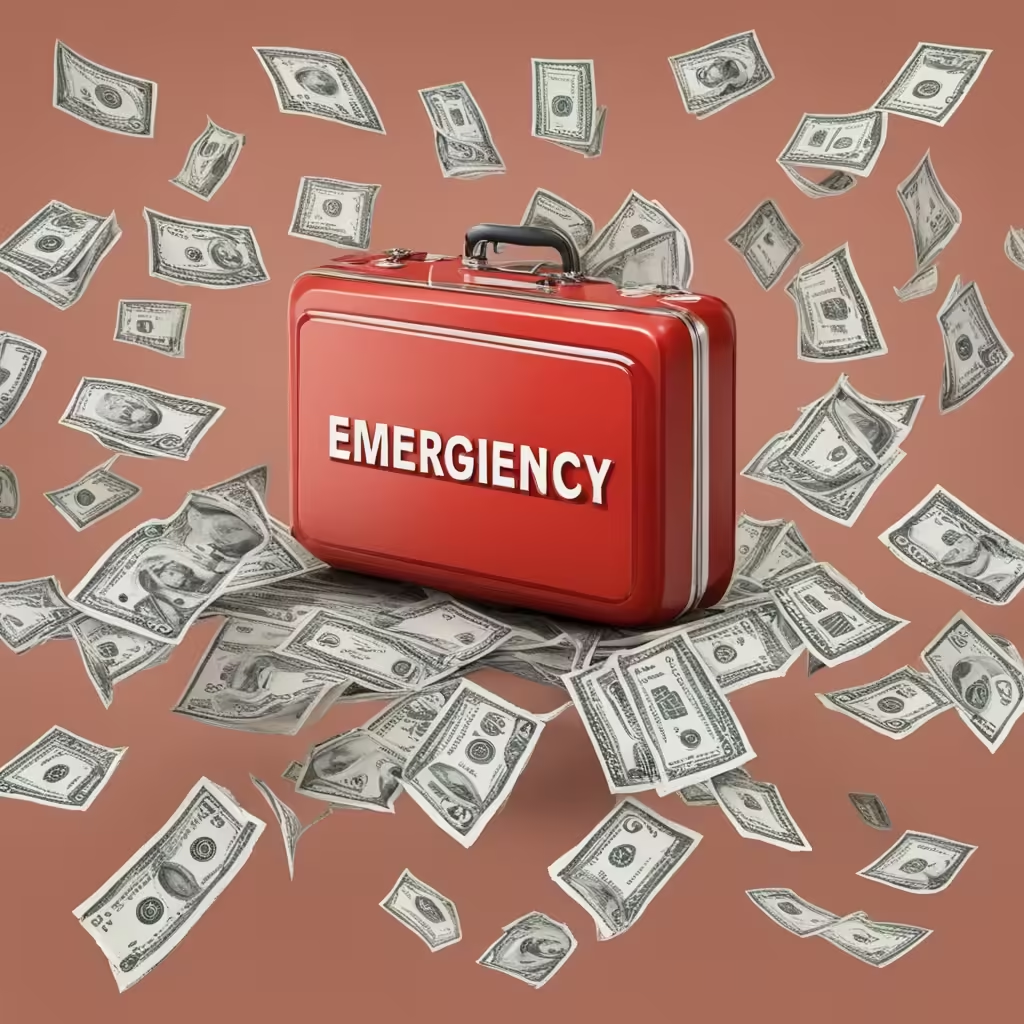Emergency funds: The key to financial security
Emergency funds serve as a crucial safety net that provides individuals with a sense of financial security. Having a reserve of funds specifically allocated for unexpected expenses can significantly reduce stress related to financial uncertainty. In fact, emergency funds empower individuals to tackle unforeseen expenses such as medical emergencies, car repairs, or sudden job loss without resorting to credit cards or loans, which may come with high interest rates.
The general recommendation is to save at least three to six months’ worth of living expenses in an easily accessible account. This amount offers sufficient coverage for most emergencies, allowing individuals to maintain their standard of living during difficult times. According to a survey conducted by Bankrate in 2021, about 27% of Americans do not have any emergency savings, which highlights a significant vulnerability should unexpected expenses arise (Bankrate, 2021).
Moreover, the psychological benefits of maintaining an emergency fund cannot be understated. For many, knowing there is a financial cushion available reduces anxiety and boosts confidence in managing personal finances. Research has shown that individuals with emergency funds report higher levels of financial wellness compared to those without them (Pew Charitable Trusts, 2020). This sense of security can translate into increased productivity and better decision-making, both personally and professionally.
In addition to providing immediate financial relief, having an emergency fund can also encourage wiser spending habits. When people know they have reserved funds for emergencies, they might be less inclined to make impulsive purchases, as they become more conscious of their overall financial situation. This mindful approach to spending can lead to better financial health in the long run, further solidifying the importance of saving.
Experts suggest that establishing a separate savings account for emergency funds can help individuals keep these funds distinct from everyday expenses, making it less tempting to dip into them for non-emergency situations. Automating transfers to this account can facilitate consistent saving habits, ensuring that individuals are regularly contributing to their financial safety net without having to think about it actively.
Overall, emergency funds are essential for maintaining financial stability and peace of mind in today’s unpredictable world. By prioritizing the formation of these funds, individuals can enhance their resilience against financial setbacks and foster a healthier relationship with their finances.
Bankrate. (2021). Survey: Millions of Americans lack emergency savings.
Pew Charitable Trusts. (2020). Many Americans are struggling to make ends meet.
Understanding the psychology behind emergency funds
The perception of financial security is deeply intertwined with our psychology, influencing how we react to financial challenges and opportunities. When individuals lack adequate emergency funds, they often experience heightened anxiety and stress. This state of constant worry can lead to poorer mental health outcomes, including depression and feelings of helplessness. A study conducted by the American Psychological Association in 2019 indicated that financial stress is one of the leading causes of anxiety among adults, with 72% of respondents reporting that financial concerns negatively affect their mental well-being (American Psychological Association, 2019).
Moreover, the correlation between having emergency funds and improved mental health is well documented. An individual with an adequate financial cushion is not only more likely to feel secure but also to have a clearer mind for making responsible financial decisions. With less stress clouding their judgment, these individuals tend to prioritize long-term planning over short-term fixes. A report from the Financial Capability Study indicated that individuals who save for emergencies exhibit greater financial capability and show more positive financial behaviors (FINRA Investor Education Foundation, 2018).
The act of saving can also bring about a sense of control, which is psychologically empowering. People often feel overwhelmed by external circumstances such as fluctuating job markets or unexpected personal crises. Having an emergency fund provides a refuge from these uncertainties, allowing individuals to regain a sense of agency over their financial circumstances. Establishing this fund nurtures a proactive approach to finances. As individuals watch their savings grow, they may be more open to exploring investment and wealth-building opportunities, further enhancing their overall financial literacy and resilience.
This emotional and psychological safety net facilitates a movement towards healthier financial behavior. When faced with a financial decision, individuals with emergency funds are more likely to make rational and informed choices, as their risk of immediate financial instability is mitigated. This awareness can shift spending patterns and promote a long-term perspective on financial planning rather than a reactive mindset focused solely on immediate needs.
American Psychological Association. (2019). Financial Stress Among American Adults.
FINRA Investor Education Foundation. (2018). Financial Capability Study.
Real-life stories: How emergency funds saved the day
Stories abound of how emergency funds have provided crucial support during unforeseen challenges, showcasing their transformative power in real-world situations. Take the story of Sarah, a single mother who faced an unexpected challenge when her car broke down. Relying on public transportation was not feasible for her, given the demands of her job and children’s schedules. Fortunately, Sarah had established an emergency fund over the years. The fund allowed her to cover the costs of a new alternator and some routine maintenance without resorting to high-interest loans or credit cards. This financial cushion not only saved her from immediate financial stress but also allowed her to maintain her daily routine without disruptions.
Similarly, consider the case of Kevin, a teacher whose school was abruptly closed due to budget cuts. With limited savings and bills piling up, Kevin initially felt overwhelmed. However, knowing he had an emergency fund put him in a much stronger position. He could cover his living expenses while actively seeking new job opportunities without the added pressure of financial instability. The peace of mind provided by his savings allowed him to focus on finding a role that suited him better rather than taking the first job that came along just to make ends meet.
Another poignant tale comes from Maria and John, a couple who faced an unexpected medical emergency. When John required surgery, Maria was faced with out-of-pocket costs that their insurance did not fully cover. They had just bought their first home, and anxiety about finances weighed heavily on them. Thanks to a robust emergency fund, they could afford the surgery without incurring debt, allowing John to recover without the stress of immediate financial obligations. Their story illustrates how nurturing an emergency fund not only secures financial survival but also nurtures emotional resilience through life’s unexpected events.
These stories demonstrate that having an emergency fund isn’t just about maintaining financial stability; it’s about empowering individuals to weather life’s storms. Individuals equipped with such funds can navigate unforeseen challenges with confidence, knowing they are prepared to handle the ups and downs that life inevitably throws their way. During times of crisis, their savings forge a pathway from fear to action, reinforcing the notion that a safety net is an investment in both financial health and personal well-being.
Bankrate. (2022). Emergency fund success stories: How savings saved the day.
U.S. Bureau of Labor Statistics. (2021). Unemployment and the effect on spending habits.
The journey to building an emergency fund
The journey to building an emergency fund is often a gradual process that requires commitment, patience, and a strategic mindset. Many individuals face the initial challenge of identifying the right amount to save and developing a plan to reach that goal. Financial experts generally recommend starting with a modest target, such as ,000, to establish an initial safety net. Once this goal is achieved, savers can progressively increase this amount to cover three to six months’ worth of living expenses, tailoring it to their personal circumstances.
One effective approach to building an emergency fund is through the “pay yourself first” strategy. This method encourages individuals to prioritize their savings by automatically transferring a designated sum of money into a separate savings account as soon as they receive their paycheck. Automation not only streamlines the saving process but also minimizes the temptation to spend funds that should be reserved for emergencies. According to a study by the American Bankers Association, households that have an automatic savings plan are more likely to save consistently and meet their financial goals (American Bankers Association, 2020).
Creating a budget is essential in this journey. Individuals must analyze their income and expenses, identify non-essential expenditures, and explore areas where they can cut back to redirect those funds into their emergency fund. Small changes, such as dining out less often or postponing certain purchases, can accumulate and significantly contribute to savings over time. A survey from the National Endowment for Financial Education found that nearly 60% of Americans do not have a budget, highlighting the missed opportunities for savings and increased financial responsibility (National Endowment for Financial Education, 2021).
Furthermore, finding a windfall can accelerate the growth of an emergency fund. Tax refunds, bonuses, or additional income from side jobs can be directly funneled into savings. Many individuals opt to deposit a percentage of these funds into their emergency savings, thereby exponentially increasing their safety net without affecting their regular budgeting routines.
Staying motivated is equally crucial, especially as financial milestones may take time to achieve. Setting distinct, incremental goals can provide a sense of accomplishment along the way. Celebrating small wins, such as reaching each saving milestone, reinforces positive behavior and encourages continued diligence toward building a robust emergency fund.
Regularly reviewing one’s financial situation is also beneficial in strengthening the commitment to savings. Life events such as changing jobs, moving, or family changes often affect personal finances. By adjusting the emergency fund target to reflect new circumstances, individuals can ensure they maintain an adequate safety net that evolves with their life trajectory.
American Bankers Association. (2020). Coronavirus and savings: New research on financial behaviors.
National Endowment for Financial Education. (2021). Financial Literacy in America: Opportunities for Growth.
Statistics on the importance of financial safety nets
Statistics reveal the significant role that financial safety nets play in enhancing financial stability and well-being. A study carried out by the Federal Reserve in 2020 found that nearly 40% of Americans would struggle to cover an unexpected expense of just 0. This statistic underscores a pervasive vulnerability in financial preparedness among many households (Federal Reserve, 2020). The absence of an emergency fund not only limits the ability to respond to sudden expenses but can result in deeper financial crises that can spiral out of control.
Moreover, having a financial cushion in the form of emergency funds has shown to influence overall economic resilience. According to research by the Urban Institute, families with savings are better equipped to weather economic downturns and are less likely to experience severe negative impacts following job losses or large unplanned expenses (Urban Institute, 2018). This buffer allows them to maintain essential spending, such as groceries and rent, thereby stabilizing local economies during challenging times.
The correlation between savings and economic behavior is observed in various studies. A report by the Pew Research Center indicates that individuals with emergency funds are more likely to engage in proactive financial behavior, such as paying bills on time and maintaining low credit card balances. These positive habits reinforce the cycle of financial security, as timely payments and low debt levels can lead to higher credit scores and increased opportunities for low-interest loans (Pew Research Center, 2019).
Further reinforcing the importance of safety nets, research from the Financial Planning Association found that individuals without emergency funds are significantly more likely to report feeling stressed about their financial situation. Approximately 35% stated they worry about their financial future daily compared to only 14% of those who have sufficient savings (Financial Planning Association, 2020). This stress can lead to poor mental health outcomes and decreased productivity, illustrating the profound indirect benefits that having an emergency fund can provide.
The widespread acknowledgment of these statistics points to a growing recognition of the importance of financial safety nets. Programs promoting financial literacy and emergency savings accounts are increasingly being integrated into community resources, helping more families establish their emergency funds. Financial institutions are also adapting by offering products specifically aimed at encouraging savings for emergencies, further embedding this essential practice into financial planning for individuals and families alike.
Federal Reserve. (2020). Report on the economic well-being of U.S. households in 2019.
Urban Institute. (2018). The implications of emergency savings on household stability.
Pew Research Center. (2019). 10 facts about Americans and their credit cards.
Financial Planning Association. (2020). Financial Planning in the Age of COVID-19.
Overview of findings and final thoughts on emergency funds
The insights gathered throughout this exploration emphasize the importance of emergency funds in promoting not only financial security but also improved mental well-being. Research consistently indicates that individuals with sufficient savings exhibit less anxiety and greater confidence in managing their finances. This psychological advantage is vital in fostering proactive financial behaviors, such as prudent spending and debt management. Additionally, the ability to handle unexpected expenses without succumbing to debt alleviates stress, allowing individuals to focus on long-term financial goals rather than immediate crises.
Statistical evidence supports the notion that emergency funds are crucial for economic resilience. A significant portion of the population struggles with financial preparedness, highlighting the need for tailored education on savings practices. As financial stability becomes increasingly linked to mental health, empowering individuals with the tools to build and maintain an emergency fund can play a transformative role in enhancing overall quality of life.
This holistic understanding of the role of emergency funds reinforces the urgency for individuals and families to prioritize their financial safety nets. By implementing effective saving strategies and embracing a mindset of preparedness, they can safeguard their financial futures and pave the way for greater opportunities in life.
Federal Reserve. (2020). Report on the economic well-being of U.S. households in 2019.
Urban Institute. (2018). The implications of emergency savings on household stability.
Pew Research Center. (2019). 10 facts about Americans and their credit cards.
Financial Planning Association. (2020). Financial Planning in the Age of COVID-19.




